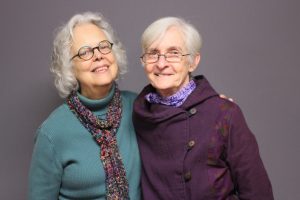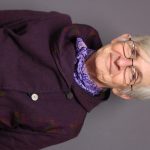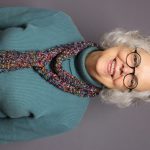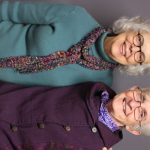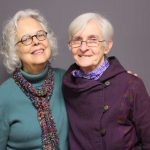Rosalie Dance and Marilyn Clark
Description
Rosalie Dance (73) speaks to her friend, Marilyn Clark (70), about growing up in the small town of Jersey Mills, PA. As a college student, Rosalie became involved in a Quaker group. She later became a professor of mathematics, which she sees as a "key to social justice."Subject Log / Time Code
Participants
- Rosalie Dance
- Marilyn Clark
Recording Locations
St. Matthew Catholic ChurchVenue / Recording Kit
Tier
Partnership
Partnership Type
Fee for ServiceKeywords
Subjects
Transcript
StoryCorps uses Google Cloud Speech-to-Text and Natural Language API to provide machine-generated transcripts. Transcripts have not been checked for accuracy and may contain errors. Learn more about our FAQs through our Help Center or do not hesitate to get in touch with us if you have any questions.
00:03 I'm Marilyn Clark. I'm 70 years old today today, which is April 29th, 1940 19th. I'm sorry.
00:19 April 29th 2016
00:23 And I'm in Baltimore at st. Matthew's Catholic Church on Loch Raven.
00:31 And I am related to Rosalie Lindquist by friendship and Chris.
00:43 She's a friend to Rosalie Lindquist. I got to meet her. I'm related to Rosalie as a friend coming in for a landing getting a little more together as we get this started. My name is Rosalie Dance. I'm 73 years old. It is April 29th 2016 and we are in Baltimore Maryland my relationship to Marilyn Clark my partner and Miss interview is a relationship or friendship.
01:18 So Rosalie, we know each other from Stony Run Friends Meeting. The first time that I saw you you were sitting in the bench behind me and I knew sort of by process of elimination who you were and it was really a little while after that is like a sometime after that before. We really started talking and getting to know one another and now we have known each other for
01:54 For five years about that and I've enjoyed getting to know you and have enjoyed learning about you through the various ways that I know you.
02:09 So I wanted to do this with you today because I admire how you are in the world as a Quaker as a thoughtful person as a person who has a very strong sense of social justice and also interested in mysticism so you could have him body a lot of things about what I think Quakers are so I thought it would be
02:44 Fun to have this time to talk with you. I was quite honored that you asked me. I don't know how we will proceed here. But I think it's good to talk about such things I do too.
03:02 Let's start with early background for you. I'd I'd like to know about your early interest in religion spirituality. Those aren't always the same maybe even early mystical experiences. You may have had.
03:24 Yes some I grew up in a family that I would have thought of as say yeah a Baptist Family.
03:37 Except that it was really my mother and my mother's side of the family who were so my father came from a Catholic Family and he was not a Believer and in fact, his mother had raised him not to be a believer but to believe in humankind.
03:56 And
03:59 The little church that we went to was the only church there was to go to in our village and it was in the local school house a little country Schoolhouse. My Village only had 90 people in it and it was a church that had been started by my grandfather. My mother's father and was very influenced by his way of thinking which was a very broad way of thinking he was so I'm sure he would have said he was deeply Christian it was he who taught me to read and you taught me to read from the Bible.
04:40 But his his belief was was very focused on caring for others.
04:50 So so I was in a church environment, although a very unconventional church, I think.
04:59 But
05:01 I went there to learn and I and I went to the woods for relieved deeper religious experiences spiritual experiences would be a better word for that.
05:18 I don't think I was aware of that until I was a teenager and I think around, you know the age of 14 or so. I began to use my walks in the woods to connect to the Earth and to connect to the spirit.
05:38 And I think the first time I thought explicitly about it was a time when I was sitting under a tree in the forest alone and the deer came and stood right near me and fed, then just stay didn't didn't write didn't go away and then a rabbit came and it was it was just such a wonderful thing because I was just part of it.
06:07 And then I found that I could.
06:10 Bring that experience back. That is I could go to other places to the creek to the place along the run where I took you and and I could
06:22 I could sit down and wait for that experience.
06:29 I don't know. What does that answer the question? Oh, yes. Yeah, and that waiting. What were you how did you wait for the experience?
06:40 I just in the silence until just waiting for the connection to to the Earth and then to the spirit. It was all one thought to me I think.
06:56 And when you had the time and the opportunity to do this and then you went back into your life school or with your family. How did that how did the two connect for you?
07:15 I don't know. It was just another part of me and I I think I said before that I went to church to learn and I think what I learned at church was.
07:28 The way we the way we need to treat each other and so I think these two while they were in separate places and one was me alone. And the other was with people I think I thought of them as two very interconnected.
07:49 Parts of of my life and that you mentioned your grandfather. And how how was he also would an early teacher for you? Well, we lived in the same house and
08:09 I had other teachers you do my aunt and my father my father told me to write my grandfather taught me to read but they were there and so, you know what you just made up his mind that it was time for me to learn to read that I could and so can we picked up the Bible and said now we read this and say we did.
08:34 It's a small village the name of the villages Jersey Mills. It's in the Pine Creek Valley in Pennsylvania. And the valley is a succession of small villages and this particular one I had when I was growing up a school house, but I didn't go to that school my sister did but then the school closed and my father had clamored for the children in the valley to be able to go to the schools in town. And so I didn't go to that school. But that is where we will use that building for church.
09:21 And it had one store. It had been a very fine store when my parents were children both my parents grew up in this Village had been a very fine store, but when the owners of it died, it was bought by a woman who was a bootlegger and it became quite a different matter altogether, so it wasn't but you don't like me to go there to buy soda pop and a candy bar, but there wasn't much else that we could get it that store.
09:53 I'm so relieved it was you know, just in those days 90 people lived in the village it sits in the valley of narrow Valley so the creek which is really a river but it's name is Creek flows through it. And there's not a lot of other space and there we were the few of us had a lot of cousins who live there too. And it's been in your family for how long yet my my grandfather though. The one who was the teacher as the one who taught me to read bought a very large part of that Village he
10:40 He was from a different part of Pennsylvania, but he had gone west to well. He talked in a succession of one room School houses buddy pan for gold in California and he came back with that gold and with it. He bought a large number of houses in this Village. Obviously, there was no large number in the village, but he he bought what all belong to the house that I grew up in and
11:13 He let me see what you actually asked me. There are two were in any case you're always so when that was and now I think I think he moved there probably about 1900 but it may have been before 1910. My mother was born there. My my father's family came a little bit later and they rented a house from my the grandfather. I'm speaking up.
11:43 My experience in that Valley was that you work into everybody whose house we walked by. Well, that's true one way or another. Well, let's let's think about then when you began to pull away and go to college and begin to look at your academic interests and also around this time. You were no longer relating to the little the little church, but found your way begin to find your way into something very different. Can you talk about that?
12:29 Will is that that little church in the schoolhouse was still there when I graduated from high school and that's still where I went when I was there, but when I went to college because that church had been nominally Baptist. I went to a Baptist Church and I was I was bit shocked by what I saw a Baptist Church was out in the rest of the world and I don't know that that's true of a you know, that it would have been true in other places a bunch of so I began to look around at churches and I probably went once to every church at the town where I was at was Carlisle Pennsylvania, and you know, it was interesting to do that, but I wasn't attracted to any of them until eventually
13:28 One of my professors invited a group of us to meet with him about once a week and he was a German Jew who had been involved in the underground in Paris during World War II.
13:49 And while he was there, he was very involved with Quakers. And so he recognized among the small group of people that had come together unlikely relationship to Quakers. None of us were a but but he said, you know, I think you would find that interesting and useful and then he told the one Professor track at her college was a Quaker about us and he said well then we'd better start a little meeting on, what do you suppose it was it he recognized among you?
14:30 Of course, I don't really know of but but I but we were all very focused on social justice issues. And in those days particularly civil rights issues and I I think he saw whatever else I mean, I know it was there. So I suppose it's part of what he saw the passion that we had about that and the willingness to work at it. Were you any of you actively doing things on campus at that point? We were like, oh, we we started a little organization can't remember its name anymore. But we and we were just trying to be seen and heard, you know, so that so that other people might be forced to think.
15:22 We
15:25 Would sometimes make an attempt to integrate segregated restaurants and things like that and we spoke out a lot.
15:39 Call eight, you know, trying to integrate restaurants, like one of those memories and particular taste and out trying to implement that or will it it was interesting most of the restaurants in that town. We're not we're not segregated. But those that were where were very good at discouraging assuming we could have tried harder I think but we felt that if we would go there then at least we were alerting them.
16:16 To our understanding that they were segregated that we didn't approve of it, but we would go and we would be told that well, you know, you do have a reservation, you know, we never had a reservation. So the next time we would call and ask for a reservation and they would say what we don't take reservations. So we we felt that we had made our point with them and you know, we didn't we didn't try really hard to do to go beyond that.
16:45 Most of them
16:48 Most of that group of people did also get involved in in a lot of civil rights action in the South. I did very little of that because I had other things I had to do in the suffers work work. So that was that the group that this professor told together. There were there were probably a few more of us who are involved in some of that and then when you met with the the teacher who was also a Quaker what began to happen then will the two of them both of those professors.
17:36 Invited us to go with them to a to a quaker meeting that was not in the town. It was quite a ways away. But we did that I think maybe we went one once a month and and that was a very remarkable experience for me. The meeting house was a beautiful very old place. You don't say beautiful, but it's in the Quaker since it's a very very playing place and it was a stop on the Underground Railroad and you know the first time we went there.
18:17 I had not yet met any of those people. I was just there with people I knew but I felt during the meeting for worship that I did truly know them that we were just very connected and the the feeling of connection and the feeling of belonging in that meeting house was so strong and it was very much like being in the woods with a deer and a rabbit and you know, it's so I think I became a Quaker that you were easily convinced. I was that's one of the terms that we use is Quaker as if you're convinced. Maybe you weren't born a Quaker but you become convinced and can you describe that that meeting house a little bit more you said it was beautiful in a simple Quaker way.
19:17 You know, I haven't been in there since 1963, but I'll tell you what, I think I remember whether indeed. Do you know anybody who heard this would say? Yes, that's the place it it was fairly large and it it had wooden benches.
19:42 And oddly for a Quaker Meeting House, they all faced in the same direction.
19:49 It had lots of Windows and lots of light.
19:55 And you could see in the back where a person would have ascended to a sort of addict. That's where people were. We're hittin ascended to the attic and wasn't necessarily a Stairway there weren't there was a pool down when you couldn't see that either, but presumably did you ever go look up there? I know you.
20:32 Because it wasn't so that you just simply could not mean I think if if that had ever become my meeting house, you know, where the way Stoney Run has or Adelphi I would no doubt have asked to do that. I would have made sure I could do that. But but this was this was while I say I belonged in it. In fact, it was not mine. Yeah. Yeah and the the meeting for worship. How does that?
21:03 How was that like your earlier religious experiences? You said a little bit about that, but can you say anymore?
21:13 Mixed up with the rabbit and the deer and the learning and the well, I don't know what I can say that helps but the it's it's a little bit about what happened seta. Yes and me to write what happens to me is is the deepening feeling a connection to the spirit and to the people in the room to the spirit in each person in the room.
21:47 And a
21:50 In those first meetings, I
21:57 I didn't do anything to make that happen. It just enveloped me.
22:06 Do I often do I I consciously
22:11 Connect my spirit to yours send to everybody I get reach which is you do. I hope everybody?
22:22 In the end what I believe is that we do that because
22:31 Because the connection of all of us
22:35 To the spirit changes strengthens the spirit
22:41 In the world and it strengthens us and it strengthens us so that we can go out of the meeting and live what we believe and make the kinds of differences that we recognize need to be made.
23:02 So that's been an important part of your
23:07 Life is to work towards those differences that you feel need to be made in this world. And I know that you studied and then became a teacher and a professor of mathematics and at that seem to be also a really important part of this whole story of your spirituality.
23:35 And what is right in the world? So can you talk with about that for a little bit?
23:43 Well when I was in high school and my sister was in college, she was studying physics, but she she volunteered a lot at the mckimmon center in Baltimore and she told me a lot about that and her experiences.
24:05 And somehow in the course of all that I've learned about the notion of Sociology. So I told her I wanted to be no, I didn't say that. I'm sure I said I wanted to be a social worker and she said all froze soaking hell no, no, no be a mathematics teacher because if you want to make a difference to people
24:24 Helping them to learn mathematics is going to make so much more difference than anything you can ever do as a social worker.
24:34 Which surprised me a lot but
24:39 As I lived with that thought I was probably a senior in high school at the time. Although I don't know I
24:48 I came to believe it more and more and I think you know, I love mathematics. Anyway, it was what I did to make myself happy. We you know living there as I did with the very tiny village not so much to do mathematics was evening entertainment. So I thought I would nice to be able to study mathematics. I'll do that until I see what I can do with it. Well her notion that teaching mathematics made a difference.
25:19 Came to make more and more sense to me.
25:22 As I studied it as student, but then I left college and went to Africa to Tanganyika, which is now 10 Sania to teach and and I could see how much difference it was making to a person who learned it how they felt differently about themselves and how they could impact their world and how they could take control of their own lies. I saw that and what level were you teaching at a high school high school? I taught for the first three years in in a secondary school for girls in Tabora Tanzania, and that was significant because of the fact that they were girls, you know, I don't like to be young African men knew that they were in control, right, but for the girls mathematics made a difference and then for the following three years
26:22 Thought in school for southern African refugees and again, you know these for people who who had some major life struggles but adding mathematics to their repertoire was was very, you know, it was strengthening it was empowering.
26:44 And and also probably I never asked anybody this but probably like for me it was also a very no it's it's a beautiful thing that you can just do yourself. And so there's also that the light in it, so if a lot of your life
27:05 Is in southern African Freedom Movement and you're going off in the front lines on every school vacation.
27:14 But you have something beautiful that you're really good at. It doesn't take much equipment then maybe that made as much difference to them in that way as it has it had to me, but then I came back to the United States and
27:38 And I did a master's degree first, but then I then I taught in a school for
27:45 People who young people who had had some very very difficult lives that was just for one year and then and then after that I talked in public schools in Washington DC and I get and I saw how much difference it made to somebody's attitude toward their own, you know what their ability to become what they wanted to become if they if they had everyone's respect because of their knowledge of mathematics and if they had their their own,
28:20 New self-image because of that because of the way the rest of society looks at.
28:28 People who can do mathematics. I mean it's it's not a particularly real thing. It could have been you know basket weaving right but it happens that this Society admires mathematics. Oh, so that's the reason that that's the right thing to do in our society and used you saw many students who had that kind of transformative self-esteem experience as a result of any particular student stand out to you, you know, lots of them with you told me about a Georgetown student. Oh, well, yes. Yes it was.
29:19 Very very good at mathematics and very very tall and it just about 7 feet tall and he was basketball player of course and she is his coach was just so happy to have a student who was excelling in mathematics because the coach felt that great need to improve the reputation of his team and he knew that was Ruben he could do this so he had pictures of him every play seek God and he had pictures of of him and me since I was his math professor at the time and it's so it was soup was good for the University good for the basketball team. It was good for Reuben and it was good for me.
30:06 But I think I think for an African man, it's a different matter though then for a lot of the American students that that I talk because I think when you have a group of people in a society that are that are not treated with real respect and that that are given fewer opportunities and so forth that that when you can let such person know that he or she
30:49 Excels in mathematics it opens the doors that that just weren't open to them before because people do in fact respond to do this and it's some
31:04 Well, it says it just gives people strength. I was recently visiting with a young girl who is now a math teacher who thinks of me as her mother. And and the reason for that is only that she was really having a very difficult life through high school. She was a good math student and we we connected really well then she went on major to mathematics and decided that she would do that for people to
31:34 You know what? I'm putting together and in my mind that you're talkin right now Rosalie is is the answer to a question that I had when we when you first brought this up before we were talking here and and you were saying that that math mathematics had so much to do with your spirituality and actually has a lot to do with your Quaker orientation and I'm hearing oh mathematics is like an is another way that there is that of God and everyone manifests itself. This is true. My thinking about that is is that it's my
32:25 It's my key to social justice that has no say it's it's what I can contribute to social justice. Not that I can't do anything else. But this is what I really know and so I can I can help put somebody into a position to take control of her life if she chooses to do it that way and and I just think that's what we all need. You know, we need to know that that we can do the thing that we want to do might take a lot of persistence. It might take a lot of hard work. But but we can all do this and if mathematics takes you there at me other things can take you there but mathematics can and for so many people it does so it's a great pleasure to be able to to help Implement that
33:24 We have becomes a pathway for for some not not for everybody know those people who know the pathway. They have 1/2 of course. Yeah. Yeah. Yeah, so sort of bringing all of this together. I wonder
33:50 If you could say anything about the spiritual lessons that you have learned that you know, your might have to do with your approach to life as a Quaker or is it a Quaker mathematician or
34:08 Lessons of anyway you want to respond to that.
34:15 I think gum.
34:20 I think that I have learned.
34:25 That persistence
34:29 In things that you that you believe in and want
34:36 It is the key. That is you.
34:40 You can get there from anywhere, but you you have to
34:49 You have to be willing to overcome the obstacles that get in your way. You have to recognize that there's always a way around it and then you have to work until you're there and
35:02 And I think that
35:08 That that's the reason will they the connection between social justice and and for me?
35:17 The spirit
35:20 Is critical, you know that that for all of us there's work we need to do and maybe you do for some people it's it's painting a beautiful painting that's their contribution. So don't mean it always has to be the same kind of thing. But it mean you will make a difference to your world. And and if you do that if it comes from
35:44 The spirit if it comes from your spiritual life, then it will be more beautiful.
35:53 And doing either of those without the other.
35:58 Wouldn't be quite as beautiful brands.
36:05 You mentioned earlier that you were shocked.
36:10 In that one that particular Baptist Church. I have been in others, but we're not shocking and I came from one. That was not it. Yes. Yes. Yes.
36:22 Oh well.
36:26 I think I said earlier that.
36:30 That my father was was not part of our church voidness in my family and the kind of preaching that was done in the Baptist Church that I went to in the town where I went to college. I was very condemning and I felt every time I listen to a sermon that that this was kind of relation of my father who was one of the best man I ever knew so I thought well, you know this this is not the place where I can worship the God that I know.
37:10 It was it was that kind of thing and and I was really thinking of it quite personally in terms of my father, but I was also aware that and I had not yet being a Quaker. I didn't use this phrase that have God in every person but we do believe there is that of God in every person and when I heard that I thought of all the people who were condemned by the language at this church, and I found it.
37:41 Quite quite inhibiting to my own connection to the spirit.
37:52 Well, I want to thank you for
37:57 Agreeing to do this interview with me. It's been really really a pleasure and you know, I think it that this gives us a great excuse to talk about things that we haven't talked about and for me to learn some really wonderful things about you and I'll thank you. Well, thank you for asking me Marilyn. I've always enjoyed really talking to you wherever we are in the end whenever so this was just another time of it one more time.
